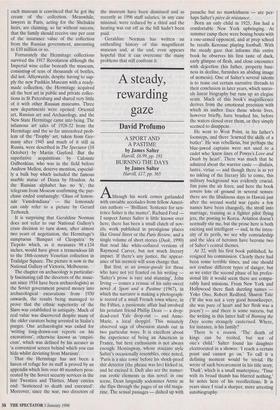A steady, rewarding gaze
David Profumo
Although his work comes garlanded with enviable accolades from fellow Ameri- can authors — 'Brilliant. Sentence for sen- tence Salter is the master', Richard Ford I suspect James Salter is little known over here; there has been a small clutch of nov- els, work published in prestigious places like Grand Street or the Paris Review, and a single volume of short stories (Dusk, 1990) that read like white-collared versions of Raymond Carver, but not much literary impact. If there's any justice, the appear- ance of his memoir will soon change that.
But first, as an amuse-gueule for those who have not yet feasted on his writing 'Salter's prose is rare and stunning', John Irving — comes a reissue of his salty-sweet novel A Sport and a Pastime (1967), in which the narrator is making a photograph- ic record of a small French town where, in the Fifties, a passionate affair had involved his petulant friend Philip Dean — a drop- dead-cool Yale drop-out — and Anne- Marie, a local shopgirl. This minutely observed saga of obsession stands out in two particular ways. It is excellent about the experience of being an American in France, but here enthusiasm is not always enough: Hemingway, whose staccato style Salter's occasionally resembles, once noted, `Paris is a nice town' before his shock-proof shit detector (the phrase was his) kicked in, and he excised it. Deft also are the numer- ous erotic elements in this novel: in one scene, Dean languidly sodomises Annie as she flips through the pages of an old maga- zine. The sexual passages — dished up with panache but no mawkishness — are per- haps Salter's piece de resistance.
Born an only child in 1925, Jim had a comfortable New York upbringing. At summer camp there were boxing bouts with a one-armed opponent, and at prep school he recalls Kerouac playing football. With the steady gaze that informs this entire book he observes his first taste of duck, early glimpse of flesh, and close encounter with dejection (his father, property busi- ness in decline, furnishes an abiding image of nemesis). One of Salter's several talents is to tease out certain narrative threads to their conclusion in later years, which unrav- els linear biography but runs up an elegiac seam. Much of this book's magnificence derives from the emotional precision with which its author fixes those whose lives, however briefly, have brushed his, before the waters closed over them, or they simply seemed to disappear.
He went to West Point, in his father's footsteps, and there 'learned the skills of a butler'. He was rebellious, but perhaps the blue jawed captains were not used to a cadet who 'knew lines of Powys's Love and Death by heart'. There was much that he admired about the warrior caste — disdain, lustre, virtue — and though there is as yet no inkling of the literary life to come, this military background was evidently crucial. Jim joins the air force, and here the book covers lots of ground in several senses: there are the libidinous days in Hawaii just after the second world war (quite a few names have been changed), the stroll into marriage, training as a fighter pilot flying jets, the posting to Korea. Aviation doesn't normally stir me, but the prose here is both exciting and intelligent — and, in the inten- sity of its perils, we see why comradeship and the idea of heroism have become two of Salter's central themes.
At 32, with his first book published, he resigned his commission. Clearly there had been some terrible times, and one should not confuse different types of danger, but as we enter the second phase of his profes- sional life it would seem there are compa- rably hard missions. From New York and Hollywood there flash dazzling names Yoko Ono, Robert Redford, Sharon Tate (`If she was not a very good housekeeper, she was pure of heart and her flesh was a poem') — and there is some success, but the writing in this latter half of Burning the Days seems strangely cauterised. Where, for instance, is his family?
There is a reason. The death of kings can be recited, but not of one's child.' Salter found his daughter electrocuted in a shower. 'I reach a certain point and cannot go on.' To call it a defining moment would be trivial. He wrote of such bereavement in his title story, `Dusk', which is a small masterpiece. 'Time with its broad thumb has blurred nothing,' he notes here of his recollections. It is years since I read a sharper, more arresting autobiography.


















































 Previous page
Previous page